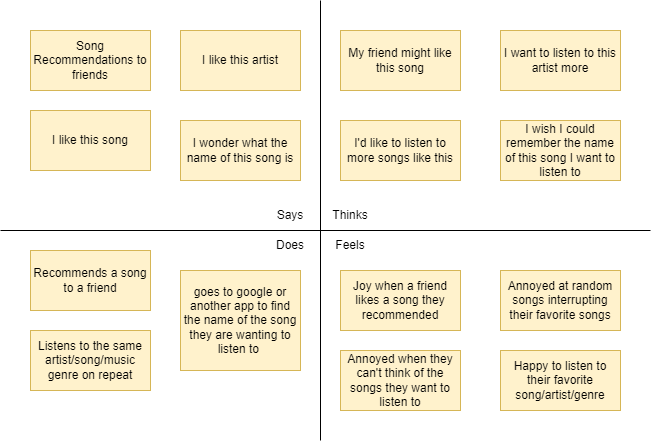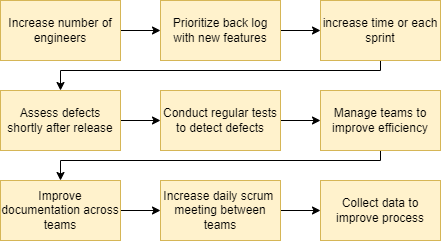Phase 1 The Company
Who is it that is doing the development of this service behing the scenes. The engineers and developers of this service need to be well defined. As well as any increase in staff that may need to occurWho are the stakeholders that are supporting us? The sales and marking team that will have a say in the features that are being shown interest and marketed.
Who is this service for? The users and their stories. The users should be getting the most out of this service. This includes streaming and creating music. As well as using a user empathy map to learn more about the users and what features they may want in the future.
Checklist
Define our team and any requirements needed to join the team
Establish a solid connection between the team, stakeholders, and the users ASAP
Prepare for the growth of our team and get new team members up to date
Keep the satisfaction of the user at the center of our focus
Key Questions
• How will the company prepare for growth with the growing demand for features?
• How will the engineering teams and stakeholders communicate effectively?
• What are the users wants or needs for the service?
Step 1: Defining the Team
As the popularity of Starify grows so will the number of developers and engineers needed to developers and maintain the service. Starting off with only 5 engineers we are looking at increasing our staff to 10 by the months end. As well as having a prediced growth for 30 by the following month, and 100 by the end of the quarter.At the start of the project there will be a greater need for engineers with more experience. As the number of engineers increases there will be a greater pool of knowledge thus allowing for less experienced engineers to join the team. Requirements for this team would be knowledge in software engineering and in the language that the service is being coded in.
Step 2: Sales, marketing, and stakeholders
Communication is key to any successful team. By focusing on clear communication between the Starify developers, and sales and marketing teams. Our sames and marketing team have already informed the developement team that the increase in interest has lead to multiple ideas for new features to add to the Starify service. This clear communication has allowed the developement team to let the stakeholders and marketing teams know how they are doing on improving and maintaining current features to in the future allow for these new features to start on developement.These coversations will be covered in the daily scrum meetings, reminding the engineers what the stake holders and users want. As well as having the team leads to communicate what their teams can and can not do to the sales and marketing team. Documents will have dates mentioned clearly so all teams know relase and due dates, to ensure marketing teams are marketing the right feature(s) at the right time.
Step 3: The Users
Aguably the most important group of people would be who the service is for, the users. Therefore, the usere empathy map must be made and well defined for the team. The empathy map is located below.
This map shows the features that the users would like to see in the service as well as what features they would be most likely to use. Engineers are encouraged to keep this map and the users in mind to create easy to use features and features that the users will actually use. These features will be more defined in a later section.
Phase 2 The Product and Design
What is it that we are designing and how are we designing it. Before working on or changing a poduct said product must be defined. Having as set vision and goals for the project reminds the team why this project is being made and what goals are. The vision is to make a music streaming and creating service. The goals are to keep the user satisfied with our service and to improve the quality of our service.Checklist
Define what the project wants to accomplish
Define features, how they will work and be used
Key Questions
• What are the goals of the project?
• What are the features?
• Will the user use the defined features?
Step 1. Vision
The Startify services intends to be the best, well rounded, and for everyone music service. Startify views itself being a users first choice for both music streaming and content creation. Users will no longer need to use any other apps to find and enjoy the newest music made by the biggest and newest artists.Step 2. Goals
The goals for the Starify service are as follows:1. Allow the user to stream music
2. Provide user with specially generated music recommendations
3. Allow users to create their own playlists
4. Allow music creators to upload their music
5. Keep a system in place to avoid users uploading someone elses music
Step 3. Features
Feature areas can be divided into client, ad generator, creation, and upload toolClient
There will be a variety of clients for the starify service, to allow for all kinds of users to enjoy the music they love.
For the user on the go there will be an app for Starify. This app will be on apple and android devices. There will also be a desktop app for MacOS and Windows OS. These apps will alert the users on updates that are available and be updated separateke.
There will also be a brower option for users. The user will have to log in each time they wish to use the service on a browser and thus maybe a less effecient way of enjoying the service, but allows the user to freely use the service on any device through the browser.
Ad Generator
Ad generation is how Starify earns money and pays its developers. Depending on the users most listened to artists products that that artist is known to support will play for the user. For the most part ads will be generated at random but always family friendly. There will also be a large variety of ads generated for the users to try and avoid repetative ads that annoy users.
As the service increases there will be an add free optiton of the service that will require the user to pay a certain amount per month
Creation
Music creators will be given many tools to attempt to get other users to listen to their music. Users that are also registered creators will have a different UI. They will have a different app as well to view or change their status as a creator.
Creators will fill out their genre and artist similar to them. They will also have something resembling a hashtag section which they can tag up to 15 tags that other users can search for and find this new creator. Starify will aslo have playlist generated for its users that are new creators that have tags similar to the artists that the user already has. These tags will also have an explicit tag again to ensure that users know if a certain song is family friendly.
Upload Tool
The upload tool will be quick and easy while also quickly scanning the file to ensure that it is not another song being reuploaded by another user. It will also scan for explicit content and warn the user uploading the content that their content will be tagged as such.
Phase 3 Developement
After defining what will be developed it is time to develop it. Developing Starify includes defining the software engineering activities, the process framework, and how changes will be made.Checklist
Define the SQA activities that will be used
Define the framework of the process
Define how the team will go about implementing change
Key Questions
• What will be the SW engingeering activities will be used to define the process?
• What kind of data will be gathered?
• How will the team go about implementing changes to the process?
Step 1. Software Engineering Activities
The process for software engineering activities will include SQA activities, security, process improvement, and data gathering.SQA Activities
Risk Analysis
Security
The security of our system is a top priority. Security reviews will occur at the begining and end of each sprint. This will ensure that any code that is implemented at the end of a sprint is secure. All engineers will be required to have DUO authentication on their work computer. And users will have the option to use duo on their account.
Data Gathering
The project metrics that will be gathered will be the backlog size, and the defect rates.
• Currently there are many active features that need to be revised and worked on which are taking up much of the backlog. Our sales and marketing team have also informed us about the interest in new features which will soon be added to the backlog as well. By gathering data on the backlog size we hope to ensure that the backlog is staying at a reasonable size. We also hope to see the rate of items removed from the backlog per sprint remain constant and at a reasonable rate. Also protentiallty increasing the rate of items our of the backlog as the number of engineers increases.
• The rate of defects will also be monitored as depending on the size of the defect it could increase the items in the backlog or delay their completuion. Gathering data on the defects will also allow us to see if there is a need for more time or engineeers to work on a feature or backlog item before its release. The Defects will be measured through its arrival rate hoping to keep the amount of defects that arise low.
The process metrics that will be gathered will be the time to realease of a feature, the number of work hours and defects per engineer.
• The time ro realease if each feature will be monitored. This will help monitor whether a feature with more time allocated to it resulted in less defects and thus helping manange the time that is allocated to a feature.
• The number of work hours will be monitored to ensure that the team is as efficent as possible. If a sprint had more work hours allocated to it then it should result in a greater amount of backloged items to be worked on.
• The number of defects per engineer will be monitored to ensure that no one engineer is lacking in provide quality work. This will also allow us to ensure that we have engineers with the proper skills requred for their posirion.
Process Improvement
Depending on the data gathered mentioned in the previous section, the process will constantly be trying to improve. The following image is an example pf how the process will imrpove through the projects developement.

Step 2. The Process Framework
The process framework chosen for the Starify service is scrum. Scurm has a prioritzed backlog which will be usefufl with how many features need work done, and also those features that the sales and marking team is wanting to promote. Scum also suppots constant changes and updating which is useful for Starify's growing team and feature list. Unfortunately the grownth of Starify and the Starify development team will make using scrum a bit difficult but with communication and team splitting the Starify engineers can overcome this.Step 3. Changes
Changes will be handled by noting all the data that was gathered from the previous iteration. Then this will be compiled in a power point presentation which will be shown to the team. Then the team will take time coming up with possible solutions. These possible solutions will be brought to a change review board which wil consist of a member from each team.
Phase 4 Putting it all together
This is our current play, as Starify grows there is no telling how big our team will get or how many features the Starify service will have. This process is solid but not set in stone and we at Starify look forward to change and improvement. If there is any confusion on this playbook contact a team lead or the creator of this playbook at star@starmejia.com.
